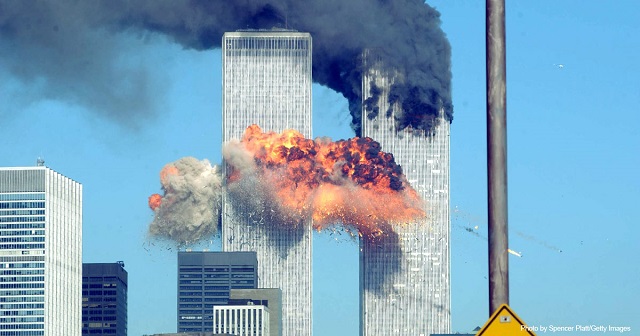September 11, 2001, is a day that lives in infamy. Millions of Americans sat in their living rooms and offices in horror, watching as hijacked planes flew directly into the World Trade Center buildings in New York City. Almost 3,000 people lost their lives as a result of the terrorist attacks.
In his speech that night, President George W. Bush declared, “The search is underway for those who are behind these evil acts. I’ve directed the full resources of our intelligence and law enforcement communities to find those responsible and to bring them to justice. We will make no distinction between the terrorists who committed these acts and those who harbor them.”
Five years later, on September 6, 2006, President Bush announced that the CIA had obtained and were holding 14 suspected terrorists in various locations. At the time, Bush made another speech, commending the CIA for its actions taken to bring justice to the victims’ families and all others affected by the terrorist attacks. “They should have to wait no longer,” Bush insisted.
Now, 24 years after 9/11, the U.S. Court of Appeals for the D.C. Circuit has ruled that three of the terrorists responsible for the 9/11 attacks are eligible to receive the death penalty.
Khalid Sheikh Mohammed, Walid Bin Attash, and Mustafa al-Hawsawi were charged with seven crimes in the United States military tribunal at Guantánamo Bay: attacking civilians, attacking civilian objects, murder in violation of the law of war, destruction of property in violation of the law of war, hijacking or hazarding a vessel or aircraft, terrorism, and conspiracy. Congress has authorized the death penalty for five of those crimes.
The trial date still has not been set for the final verdict on whether they will end up receiving the death penalty. A judge originally set the trial date for five of the terrorists for January 11, 2021. The court indefinitely postponed the date due to multiple factors, including the fact that one of the terrorists, Ramzi bin al-Shibh, was found mentally incompetent for trial, the court debating whether to accept evidence the CIA obtained from the terrorists during torture, and most recently, plea bargains from three of those on trial.
However, in July of 2024, each of these three respondents offered to sign pre-trial agreements, where they chose to plead guilty in exchange for the government not to pursue the death penalty. In this agreement, they also agreed to allow certain statements they gave to the FBI in 2007 to be used against them, and they consented to participate in a public sentencing hearing, where victims’ families could directly ask them questions. As a result of this deal, the government agreed not to pursue the death penalty. Then, on August 2, the secretary of Defense at the time, Lloyd Austin, and the convening authority for the military commissions, Brigadier General Susan Escallier, withdrew from the agreement.
In her signed statement, Escallier announced, “I have determined that, in light of the significance of the decision to enter into pre-trial agreements with the accused in the above-referenced case, responsibility for such a decision should rest with me as the superior convening authority under the Military Commissions Act of 2009. Effective immediately, I hereby withdraw your authority in the above-referenced case to enter into a pre-trial agreement and reserve such authority to myself.”
The United States Court of Military Commission Review (CMCR) ruled that Austin could not withdraw, because the terrorists on trial had already begun taking actions based on the plea deals they had signed. The government, in turn, petitioned the U.S. Court of Appeals for the D.C. Circuit for writs of mandamus and prohibition. These are, in the joint opinion of Judge Neomi Rao and Judge Patricia Millett, “extraordinary forms of relief [that] are warranted in this case.” A writ of mandamus means that a higher court can force a lower court to take an action, while a writ of prohibition means that a higher court can force a lower court to not take an action.
In this case, the government wanted to force the CMCR to reject the pretrial agreements it had originally accepted, since, according to Judges Rao and Millett, “The Secretary of Defense indisputably had legal authority to withdraw from the agreements.”
AUTHOR
Evelyn Elliott
Evelyn Elliott serves as an intern at Family Research Council.
EDITORS NOTE: This Washington Stand column is republished with permission. ©All rights reserved. ©2025 Family Research Council,
The Washington Stand is Family Research Council’s outlet for news and commentary from a biblical worldview. The Washington Stand is based in Washington, D.C. and is published by FRC, whose mission is to advance faith, family, and freedom in public policy and the culture from a biblical worldview. We invite you to stand with us by partnering with FRC.
The post 24 Years after 9/11, Terrorists Determined Eligible for the Death Penalty appeared first on Dr. Rich Swier.
Click this link for the original source of this article.
Author: Family Research Council
This content is courtesy of, and owned and copyrighted by, https://drrichswier.com and its author. This content is made available by use of the public RSS feed offered by the host site and is used for educational purposes only. If you are the author or represent the host site and would like this content removed now and in the future, please contact USSANews.com using the email address in the Contact page found in the website menu.








